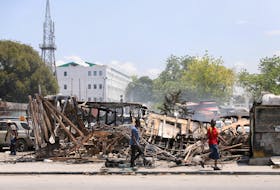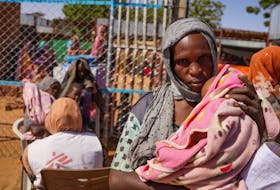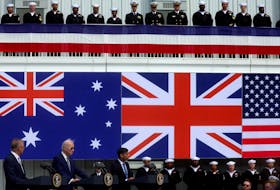By Nvard Hovhannisyan and Nailia Bagirova
BAKU/YEREVAN (Reuters) - Seven Azeri soldiers and a civilian and four Armenian servicemen were killed on Tuesday in the third day of border clashes between countries that fought a war in the 1990s over the mountainous Nagorno-Karabakh region.
The international community worries about clashes between Armenia and Azerbaijan in part because of the threat to instability in the South Caucasus, a region that serves as a corridor for pipelines taking oil and gas to world markets.
Azerbaijan and Armenia both said exchanges of fire that began on Sunday had continued into Tuesday, and each accused the other of ceasefire violations and shelling.
An army major-general and a colonel were among seven Azeri servicemen killed, Azeri deputy defence minister Kerem Veliyev said, adding: "Devastating blows were inflicted on the enemy."
Armenia's Defence Ministry said four of its servicemen, including a major and a captain, had been killed in skirmishes. Foreign Ministry spokeswoman Anna Naghdalyan said the city of Berd had been shelled near the border but Armenian forces had "destroyed the Azeri bases" that fired on it.
Armenia and Azerbaijan, two former Soviet republics, have long been in conflict over Azerbaijan's breakaway, mainly ethnic Armenian region of Nagorno-Karabakh. But the latest clashes occurred around the Tavush region in northeast Armenia, some 300 km (190 miles) from the enclave.
Russia urged the two sides to cease fire and show restraint, and Kremlin spokesman Dmitry Peskov told reporters Moscow was ready to act as a mediator.
NATO called on Azerbaijan and Armenia to take all necessary measures to prevent further escalation, according to James Appathurai, the U.S.-led alliance's special representative for the Caucasus and Central Asia.
President Tayyip Erdogan said Turkey would stand against any attack on Azerbaijan, with which it has strong historical and cultural ties and is involved in joint energy projects.
"It is our binding duty to mobilise all our political, diplomatic, social relations in our region and our world in this direction," he told a news conference.
Ethnic Armenians in Nagorno-Karabakh declared independence in the enclave during a conflict that broke out as the Soviet Union collapsed in 1991.
Though a ceasefire was agreed in 1994, Azerbaijan and Armenia continue to accuse each other of shooting attacks around Nagorno-Karabakh and along the separate Azeri-Armenian frontier.
(Additional reporting by Andrey Kuzmin in Moscow, Margarita Antidze in Tbilisi, Ali Kucukgocmen in Istanbul; Writing by Margarita Antidze; Editing by Timothy Heritage/Mark Heinrich/Catherine Evans)








